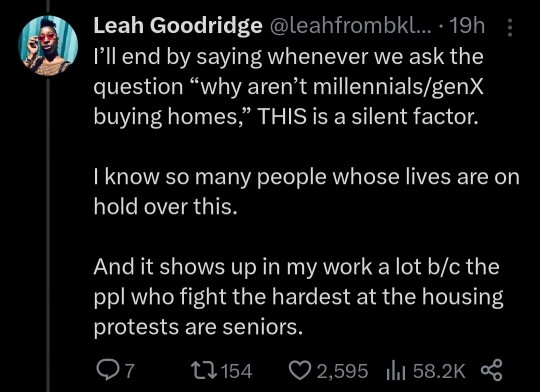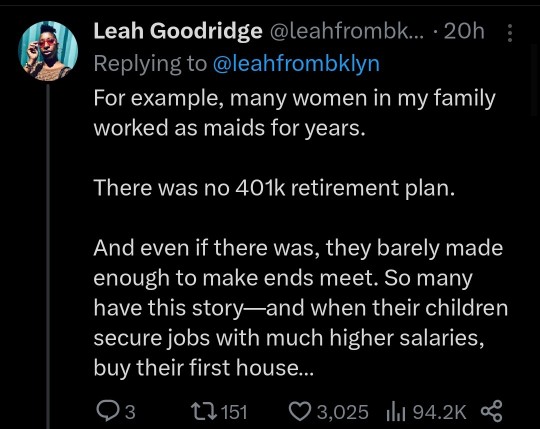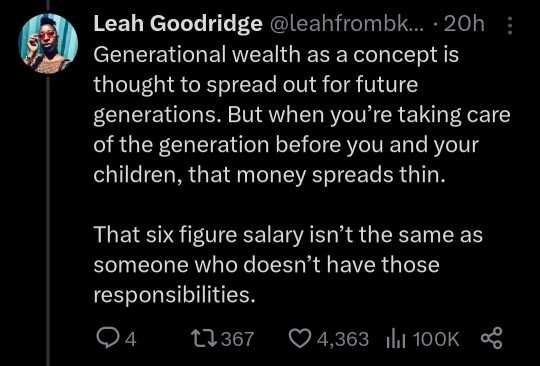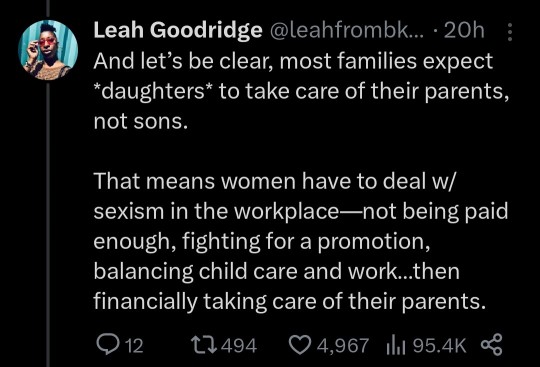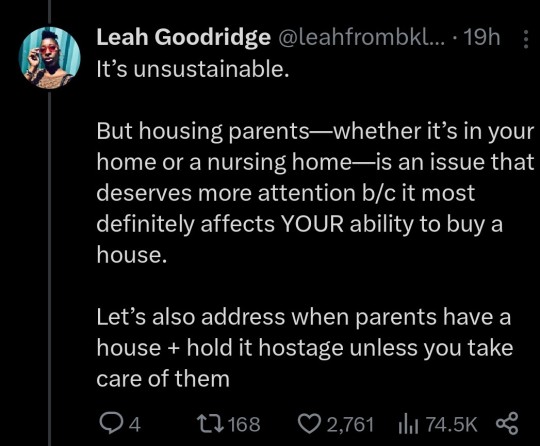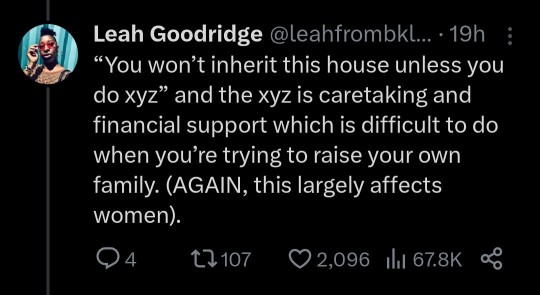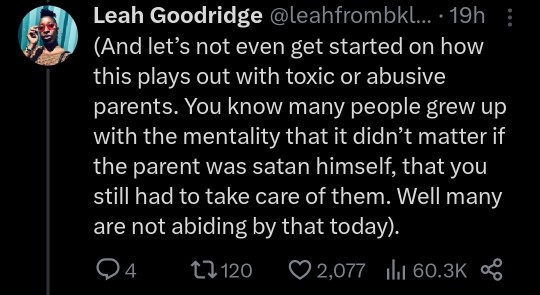#generational wealth
Text
I want wealth so solid my great grandkids gone feel it.
#soft life#soft girl#soft black girls#soft black women#luxury lifestyle#wealth#financial freedom#money manifestation#money#money making#law of abundance#law of attraction#abundance mindset#abundance#black women luxury#generational wealth#luxury black women#rich black women#rich black girls#wealthy black women
1K notes
·
View notes
Text
Black parents >
372 notes
·
View notes
Photo
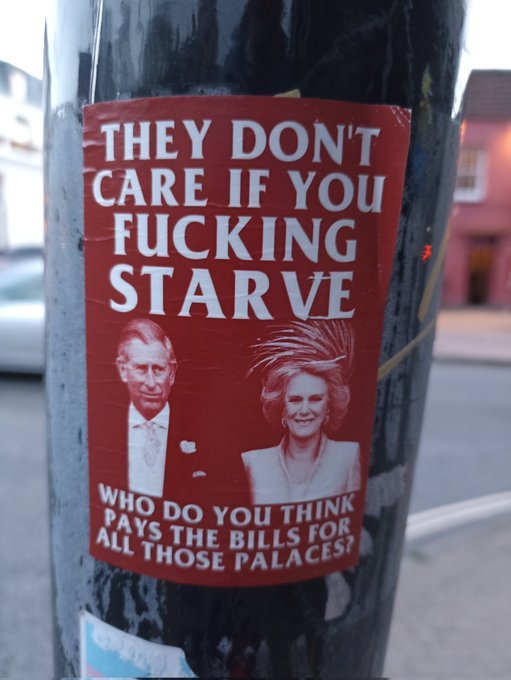
they don’t care if you fucking starve
Who do you think pays the bills for all those palaces
#coronation#graffiti#wealth inequality#hoarding wealth#generational wealth#wealth#king charles III#british royal family#royal family#the royal family#royality
422 notes
·
View notes
Text

i don’t want to be a trophy wife nor do i want to work. just. generational wealth. bas.
#desi culture#desiblr#desi tag#girlblogging#material girl#desi aesthetic#desi humor#couple#desi academia#yjhd#generational wealth#desi student#desi couple#desi#desi memes#desi teen#desi tumblr#desi girl#desi shit posting
105 notes
·
View notes
Text
The idea that rich people must have done something to deserve their money is the worst conspiracy theory
#eat the rich#fuck capitalism#class war#generational wealth#eat the 1%#elon musk#Twitter#the myth of meritocracy#i have heard too many times that musk MUST be smart and talented because otherwise he wouldn't be a billionaire#buddy that is not how being a billionaire works
234 notes
·
View notes
Text
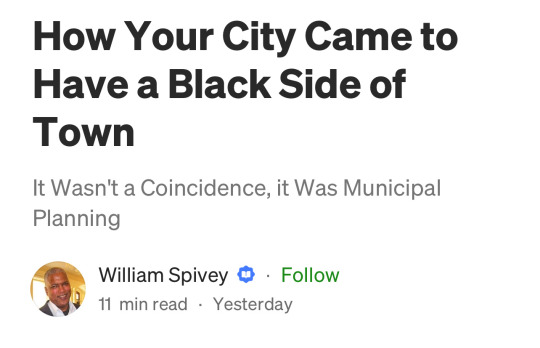
When looking at where the Black sides are, we could start by considering where they are not.
FHA and VA loans are credited with helping form the middle class of America by making homeownership available to a large portion of the population. Large housing complexes were developed, beginning with Levittown in Long Island, NY. Similar complexes sprung up in many major cities with one thing in common. No homes could be sold to Black people, with the federal government fully backing redlining, which made segregated housing the rule and not the exception. Black sides of town evolved where the whites elected not to go. There were housing complexes created for Black and Jewish people as well; these “projects” were definitely not intended for the middle class.
(continue reading)
#politics#redlining#housing#housing discrimination#racism#structural racism#anti blackness#fha loans#va loans#home loans#levitt town#generational wealth#segregation#housing projects
65 notes
·
View notes
Text
78 notes
·
View notes
Text
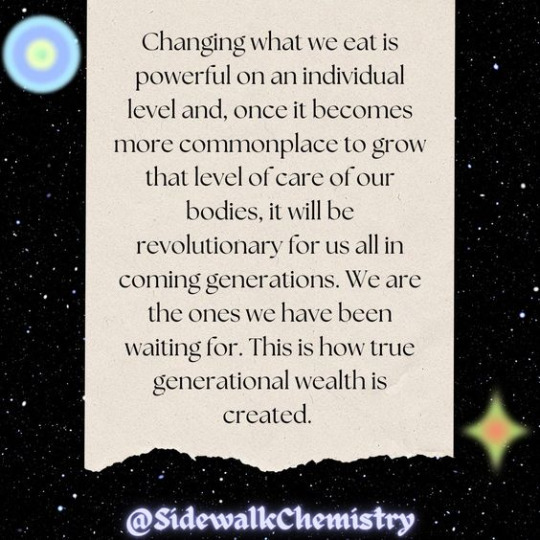
health is ~generational wealth~ too (Mucusless Diet Healing System Philosophy)
We heal our world by healing ourselves. When we grow & buy whole plant foods and transition away from processed & mucus-forming foods, we are supporting optimal gene expression, an earth-friendly world, plant-rich cuisines, permaculture & veganic farming, and more mindfulness & lucidity of mind. This is one of the best legacies we could ever leave our descendants💖✨🍇
#txt#self healing#generational trauma healing#holistic leveling up#leveling up#mindful consumption#that girl#green juice girl#glow up#generational wealth#health is wealth#solarpunk#wellness journey#lightworker#wfpb#vegan#karma#ahimsa#self care#self love#soft living#eco conscious#ecofeminism#whole food plant based#inner work#sidewalkchemistry
31 notes
·
View notes
Text
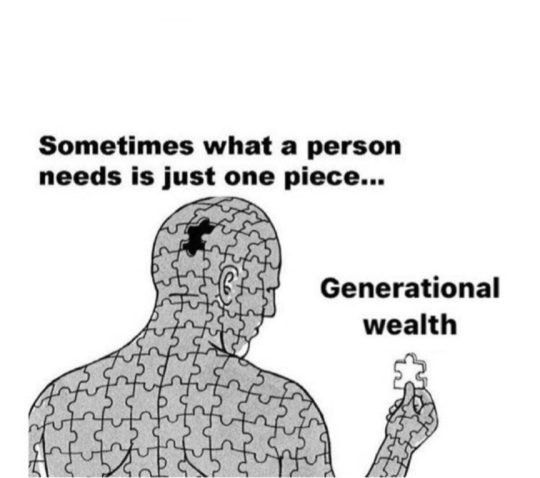
There's times when what's needed for health's
A puzzle piece placed with some stealth
The only piece left
(Without, you're bereft)
Just one generational wealth!
53 notes
·
View notes
Text
☆I want wealth and longevity not riches and virality.☆
#soft life#soft girl#luxury lifestyle#soft black girls#soft black women#black women luxury#black women in luxury#black girl luxury#luxury#luxury black women#rich black women#rich black girls#rich girl#wealthy black women#generational wealth#wealth#money manifestation#money making#money
94 notes
·
View notes
Text
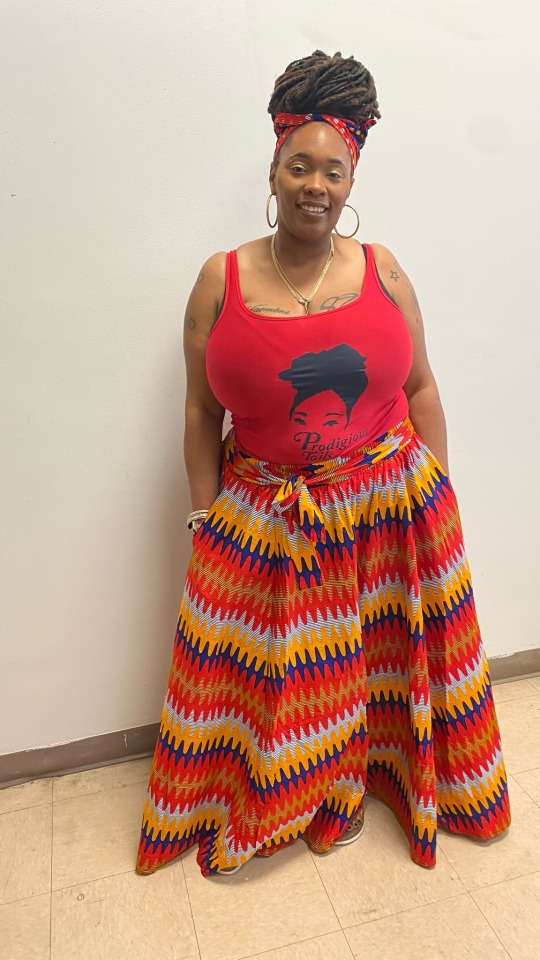
#melanin goddess#black is love#melanin queen#women with locs#black is beautiful#love your flaws#nubian goddess#love your skin#melanin#i love me#brown eyed goddess#black woman appreciation#black business#black business owner#small buisness#small business owner#women supporting women#generational wealth#gorgeous#phenomenal woman
111 notes
·
View notes
Video
Debt Ceiling
#tiktok#debt ceiling#tax cuts for the rich#economy#economics#Manufacturing Consent#budget cuts#unemployment#health insurance#wealth inequality#wealth gap#hoarding wealth#generational wealth#wealth#income inequality#inequality#recession#economic crisis#us taxes#taxes
83 notes
·
View notes
Text
https://x.com/GRE8TBLACKSHARK/status/1701210980087136399?s=20
The Blue family, Sacramento
Les Robinson had to leave a family cookout to compose himself. A cousin told him to look up an ancestor on his phone — Daniel Blue. Robinson had never heard of him, but a search revealed the longtime pastor in the Sacramento area, who was integral to the region’s Black community. Robinson learned that his great-great-grandfather was brought to Sacramento in 1849 as an enslaved man from Kentucky by John Daugherty, the son of his enslaver.
Blue, 53 at the time, worked as a gold miner and discovered enough gold to buy his freedom and become an entrepreneur, opening a dry cleaners and starting a church in his home and later a stand-alone structure. That church — St. Andrews AME Church — was founded in 1850, and it remains the West Coast’s oldest continuous African Methodist Episcopal congregation. Blue also started a school for Black, Latino, Asian American and Native American children.
And he bought property. Lots of it — 60 acres, according to Robinson, including nine blocks in Sacramento, California’s capital, documents show.
On that property today, Robinson said, stands the California Railroad Museum, the Amtrak Station, Sacramento RailYard, the courthouse and the Sacramento County jail.

“I’ve been told that it was taken because the railroad needed that land to complete the transcontinental connection,” Robinson said. “So he basically was booted out.”
And burned out, as intimidation by whites who did not welcome freed Blacks turned violent. Part of the school was burned down and rebuilt before eventually it closed years later. Blue’s house was burned in 1869. There was a failed attempt to burn down the church, too, Robinson said.
Mitchell said the seizing of property — by citizens, law enforcement or the government — comes with an additional injustice beyond stunting generational wealth: It destroys culture and history.
“Whether you’re talking about Harlem or southwest Georgia, there’s often an erasure of important culture and history,” Mitchell said.
Much of what Robinson and others in his family have discovered is documented in newspaper articles and other periodicals, which makes it frustrating for Robinson that he cannot locate deeds or ownership documentation. They have not yet presented their findings to state or local officials yet, preferring to do more research and hear what the reparations task force has to say about seized land. But they are clear about what happened.
“It was obviously taken,” Robinson said. “He was a smart man. He wouldn’t give away 60-plus acres of land.” Robinson is working on a book about his ancestor that sums up what having the land returned to him and his family would mean. Yes, he wants the land for its financial value, but also for its sentimental value. Robinson, who founded a church in 1999, said the revelations about his ancestor resonate in a tangible way. Looking back and seeing what his ancestor accomplished, “I see parallels in our life — even not having ever known him,” he said. “When I found him, I met him — and we have the same spirit. I am doing what he would want me to do.”
The Burgess family, Coloma, California
It was “exhausting” for Jon Burgess when he learned that an ancestor had been the hangman in the 1800s in Coloma, a small community about 55 miles northeast of Sacramento, where his family lineage traces.
“That’s not something you want to see, and it floored me for two days,” Burgess said.

Using eminent domain, the city seized much of the 420 acres, Burgess said. Much of the land he wants to reclaim is Marshall Gold Discovery State Historic Park in Coloma.
Burgess has testified before the California reparations task force, posted short videos on Instagram about his family findings to educate followers and connected with Gov. Gavin Newsom about the subject. “I’m just trying to get people to empathize with the fact that we had an inheritance that was supposed to remain in our family for years per those deeds. And yet it was stripped away,” he said.
Burgess possesses the deed to the land, documentation he believes that when it is properly reviewed will stand up in court, particularly because there is no record of his ancestor’s selling the land, he said.
“If we didn’t have the deed, it would just be another story,” said Burgess, a firefighter. “But we do. And the deeds can certainly tell a very different story.”
What’s next for reparations
The story for all these families is unfinished. They hope their gathered documentation will yield a result similar to that of Bruce’s Beach in Southern California, where Los Angeles County seized land in Manhattan Beach purchased in 1912 by a Black couple, Charles and Willa Bruce. White residents led a petition to have their resort for Black people condemned in 1927 and turned into a park. It was returned to the Bruce family last year. The family sold it back to the county for $20 million.
The cases are not parallel to that of Bruce’s Beach, but it elicits hope for these descendants, especially as California considers reparations in such an aggressive manner.
Burgess’ case has been acknowledged by the California task force as similarly valid to that of Bruce’s Beach, and may be included in its final report and list of recommendations, which will be issued to the Legislature at the end of June.
“Land and property are things that my pioneer ancestors did not sell or take for granted, because they knew the value, coming from slave plantations’ making others wealthy for generations — all behind land,” Burgess said. “Generational wealth means my family and descendants would have the same if not more than the Bogle family, Veercamp family, Gallagher family, Del Monte family and a host of others who came here with nothing prior to 1870 and were left to prosper — but also allowed equal protection by the laws.”
#California's earliest Black settlers bought land only for it to be stolen. Their descendants want it back.#Reparations#california#Freedmen#Black Settlers in the west#stolen land#freedmen land#generational wealth
14 notes
·
View notes
Text

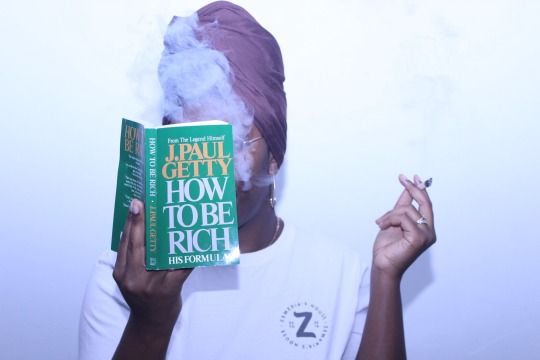

“Wealth is not about having a lot of money; it’s about having a lot of options.” - How To Be Rich
✨ Investing in ourselves, our communities, and our culture is key. Let’s continue to uplift and empower each other to build a prosperous future for Black excellence! 💪🏽🔥
#Black Excellence#Generational Wealth#Black History#Black Future#420photography#treehouse#cannabis#thc
5 notes
·
View notes
Link
Real estate is difficult. Real estate is not a get-rich-quick business. There’s nothing in this book that is going to teach you anything about getting rich quickly. This book is about teaching you how to build a business. What will the product of this business be? Real Estate. Keep in mind that real estate is simply a product of a business. If you don’t understand the business that surrounds the product, you’ll fail at the product and at the business.
#realestateraw#real estate portfolio#real estate#financial freedom#legecy#generational wealth#real estate business#economic market cycle#buyer#seller
226 notes
·
View notes
